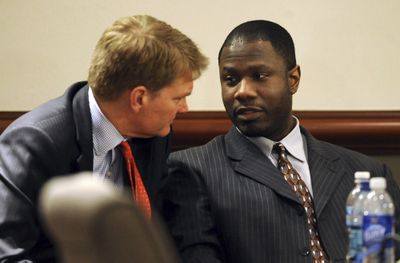Courthouse shooter convicted of murder

A man who escaped from custody during his rape trial and launched a deadly courthouse shooting spree that claimed the lives of a judge and three others was convicted of murder Friday more than three years after the rampage.
Brian Nichols, 36, could face the death penalty for killing a judge, a court reporter, a sheriff’s deputy and a federal agent in the violence that began at the Fulton County Courthouse.
Nichols had confessed to the killings, but claimed he was legally insane and gripped by a delusional compulsion that he was a slave rebelling against authority. Jurors rejected that argument, finding him guilty of murder and dozens of other charges, including aggravated assault, false imprisonment, hijacking a motor vehicle and armed robbery.
In closing arguments Wednesday, prosecutors said Nichols concocted his delusions to avoid the death penalty. A psychiatrist who testified for the state said he found Nichols mentally ill, but would not diagnose him as delusional.
Washington
Cheney’s arthritic knees to be tested
Doctors will scan Vice President Dick Cheney’s legs today to evaluate arthritis in his knees.
Military doctors will X-ray Cheney’s knees at the Malcolm Grow Medical Center at Andrews Air Force Base after he returns from Lexington, Va., where he is speaking at the Virginia Military Institute.
“He has had long-standing arthritis in his knees and the doctors have been trying to schedule a time to have his knees X-rayed,” Megan Mitchell, the vice president’s spokeswoman, said Friday. “Tomorrow provides a good time and place to have the X-rays and evaluate the condition of his knees.”
After that, Cheney is to resume his normal schedule and leave for his home in St. Michael’s, Md.
New York
FBI tracked writer Halberstam
The FBI tracked the late Pulitzer Prize-winning journalist and author David Halberstam for more than two decades, newly released documents show.
Students at the City University of New York’s Graduate School of Journalism obtained the FBI documents by filing a Freedom of Information Act request. The university posted the documents on its Web site Thursday.
The FBI monitored Halberstam’s reporting, and at times his personal life, from at least the mid-1960s until at least the late ’80s, the documents show. The agency released only 62 pages of a 98-page dossier on the writer, citing security, privacy and other reasons.
Halberstam won a Pulitzer in 1964 for his coverage of the Vietnam War while working as a reporter for the New York Times. In 1972, he wrote “The Best and the Brightest,” a best-selling book critical of U.S. involvement in Southeast Asia.
It’s unclear when the FBI began monitoring Halberstam, though the first documents made public date from 1965, when he was a Times correspondent in Poland during the Cold War.